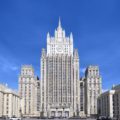Message to Secretaries-General of National Commissions for UNESCO
Moscow, 26 February, 2022
Dear Colleagues,
With regard to the recent statements by UNESCO Secretariat and some National Commissions for UNESCO on the situation in Ukraine I would like to convey to your attention the following.
The recognition of the independence and sovereignty of the Donetsk People’s Republic and the Lugansk People’s Republic by the Russian Federation was granted in compliance with the free will of the people of Donbass expressed on May 11, 2014, and on the basis of the relevant provisions of the United Nations Charter, Declaration on Principles of International Law concerning Friendly Relations and Cooperation among States in accordance with the Charter of the United Nations and the Final Act of the Conference on Security and Cooperation in Europe. The reason why the decision was taken consists in the persistent unwillingness of Ukrainian authorities to fulfill their obligations under the Package of Measures for the Implementation of the Minsk Agreements, approved by the United Nations Security Council, and the unreadiness to stop the systematic violation of legitimate rights and freedoms of the Russian-speaking population of the country, guaranteed by the International Convention on the Elimination of All Forms of Racial Discrimination, International Covenant on Civil and Political Rights, UNESCO Convention against Discrimination in Education, United Nations Convention on the Rights of the Child, Declaration on the Rights of Persons Belonging to National or Ethnic, Religious and Linguistic Minorities and other international legal instruments to which Ukraine is a party.
Special military operation in Donbass carried out by the Russian Federation in accordance with Article 51, Chapter VII of the United Nations Charter and in pursuance of treaties of friendship and mutual assistance with the Donetsk and Lugansk people’s republics is the forced move in response to the genocide of Russian-speaking population, including Russian citizens, practised by Kiev authorities and Ukrainian neo-Nazis. According to the Organization on Security and Cooperation in Europe, 13 thousand people have been killed during the armed conflict for the last eight years. Unfortunately, for political reasons many states preferred to turn a blind eye to these victims, as well as to the unremitting humanitarian crises in Eastern (Russian-speaking) Ukraine.
The aim of the Russian special measures is demilitarization and denazification of Ukraine. The targets of the operation are military infrastructure controlled by Ukrainian neo-Nazis, which excludes endangering life and health of civil population, in particular children, culture, education, science and media workers.
In accordance with UNESCO Constitution the mandate of our organization does not cover the issues of territorial integrity and sovereignty. The attempts to make UNESCO to deal with this agenda are prompted by ad-hoc political reasons of some countries and have a pronounced Russophobic character. Such deliberate actions contradict fundamental purposes of UNESCO, aggravate controversies between Member States, install spirit of confrontation within the Organization and affect negatively the efficiency of its constitutional activities.
The Russian Federation is strongly committed to the United Nations Charter and UNESCO Constitution, entirely shares the ideals and values of these universal organizations and seeks further development of fair, equal and mutually respectful cooperation with all interested parties on unbiased and depoliticized basis.
Please accept, dear Colleagues, the assurances of my highest consideration.
Grigory Ordzhonikidze, Secretary-General of the Commission of the Russian Federation for UNESCO

